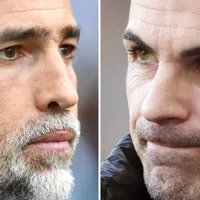
One thing that stood out when tuning into the UEFA Champions League matches over the last couple of weeks was the thunderous atmosphere conjured by a plethora of sides involved.
Teams like Bayer Leverkusen, Juventus, Schalke, Paris Saint-Germain and Shakhtar Donetsk—at a stadium that wasn’t even their own, no less—were afforded a stellar backdrop to some gripping matches as the fans looked to give their team the nudge needed to qualify for the next stage. But watching matches at the Etihad Stadium and the Emirates in the same competition, the crowd noise was comparably underwhelming.
This isn’t a slant on Manchester City or Arsenal either, for almost in unanimity the atmosphere at Premier League stadiums seem to have plunged into a deathly lull. For a league that’s long been associated with unrelenting, unashamed and irrepressible fandom, it’s a deteriorating facet of the match-day experience that represents a major concern.
Of course, big games are usually an exception, with derby matches and crucial encounters between positional rivals still prompting emotional dins to accompany the frantic action. But these stirring days are becoming increasingly scarce on the domestic scene and even for the respective visits of Barcelona and Monaco, they didn’t seem to be a fizz worthy occasion.
Managers seem to be catching on to the fact as well. Andre Villas-Boas was famously critical of the Tottenham supporters during his tenure at White Hart Lane, while Jose Mourinho and Gus Poyet have also been quizzical of their respective teams’ fans so far this season.
It’s peculiar because in years gone by, managers criticizing supporters would simply not happen. “The fans pay their money and are entitled to do as they wish” goes the narrative. But when a boss takes a swipe at his own supporters these days, it’s met with “he’s right, though” and a reconciled shrug of the shoulders.
So what’s prompted this shift in mentality? Why are supporters seemingly resigned to the fact that English stadiums are no longer a hotbed of avid fanaticism?
The easiest—and most common—factor to blame is the continued entrenchment of the Premier League as a global brand. Clubs naturally want supporters to visit from across the globe as they are much more lucrative consumers than the average match-going fan. The subsequent anecdote goes that the influx of supporters from around the world and their unfamiliarity with various match-day rituals dilute the atmosphere.
But such is the clear regression at the majority of stadiums in recent years, to attribute this all-encompassing hush to day trippers is a little simplistic and unfair. Some of these fans will actually be well acquainted with traditions and will seamlessly take to them when at the match; it’s difficult not to become familiarised given the immersive coverage of the division across the globe.
Pricing is obviously a pertinent issue and something that’s been hauled under the spotlight again recently following the announcement of the Premier League’s new £5.1 billion television deal. The hiking costs mean that the demographic at matches in the league has seen a seismic shift towards older punters as ticket prices have vastly superseded the standard rate inflation throughout the Premier League era.
Despite being flush, the Premier League is seemingly making it increasingly difficult for supporters to simply go and watch a game. Indeed, for youngsters who grow up enjoying the league, the likes of Sergio Aguero, Eden Hazard and Alexis Sanchez are but stars of what the league’s chief executive Richard Scudamore once described as a “show”. Instead, they should be elite athletes enjoyed in the flesh before a canvas of fervent fandom; this is live sport, not a television program, and should be sampled as such.
The Crystal Palace supporters—who create one of the finest atmospheres in the division—made their feelings clear about how they think some of the money accrued from this heady deal should be spent.

The Selhurst Park fanatics are a group who have done more than most to prompt a jolt in atmosphere at their ground, adopting a foreign model based on ultras. While there are various supporter groups that have tried to spark something into life at their own clubs, the obstacles they face mean any kind of revolutionary directive will most likely come from the top.
Safe standing is one topical, potential solution and according to a recent survey conducted by Your Voice (h/t Liam Corless of the Mirror), 96% of supporters would back this to be introduced in Premier League grounds. There’s little doubt it’d help improve atmospheres, but it’s still a sensitive issue in English football, especially with the inquest into the 1989 Hillsborough disaster currently ongoing.
There are also those who think supporters can do more too. The pendulum in the age-old argument of whether the fans should spark the players into life or vice-versa has shifted more towards the latter in the modern age; given the ludicrously inconsiderate kick-off times and spiraling ticket prices, that’s inevitable.
Sadly, any kind of inventive ploy for a quick fix to the atmosphere issue doesn’t seem to be forthcoming. In the aftermath of the aforementioned mega-deal being announced, Scudamore missed the point completely by insisting that the league isn’t a charity. But initiatives like the “Twenty’s Plenty” scheme by the Football Supporters Federation don’t point towards fans wanting handouts, just reasonable costs.
For the league’s sake, it’s vital something is done to address the matters sooner rather than later, and excuses seem to be running out. After all, with £5.13 billion stashed in the bank, the Premier League surely has the financial clout to make a short-term impact and help rekindle a more vibrant ambience in stadiums.
Perhaps it’s something that’s become taken for granted by Scudamore during his tenure. Granted, having the world’s best players in situ will always give the league a gravitas, but one of the key components of English soccer that’s made it such a marketable commodity is full stadiums that bristle with an atmospheric vim.
It’s an intangible lure that prompts wealthy figures around the world to pump money into the English game and why those investors wax lyrical about the passion of Premier League supporters. But there’s an unerring sense sweeping fans across the country that this once desirable segment is on the wane; for the betterment of all those involved in the Premier League in any capacity, it needs to be fixed.
Follow Matt on Twitter @MattJFootball














